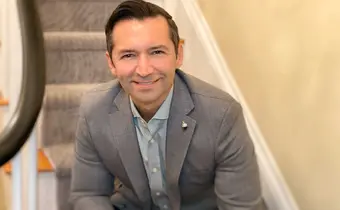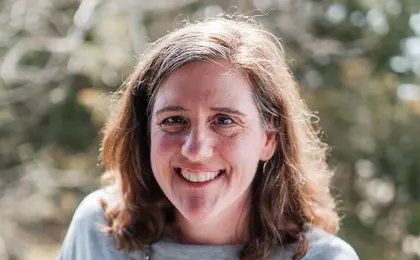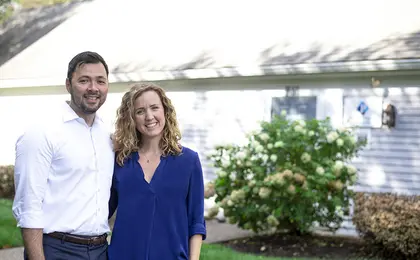
Nicolas Encina ’10
MBA for Executives
Healthcare
Current Position: Chief Science & Technology Officer, Ariadne Labs
Increasingly, complex problems are solved in the place in between—through collaboration between disciplines, teams, organization. “Science and technology discovery is continuing to accelerate,” says Nicolas Encina ’10. “It’s getting to a point of hyper-innovation where it becomes hard to keep up as an individual or as a single organization.”
Encina has spent his career at the intersection of science, technology, and business. He worked on the Human Genome Project, helped launch a series of biotech startups, and created a software as a service (SaaS) company that was one of the first healthcare investment by Google’s venture fund. His current role is chief science and technology officer for Ariadne Labs, a health systems innovation center which is a partnership between Harvard’s T.H. Chan School of Public Health and Brigham and Women’s Hospital.
“Some people get passionate and fascinated by the science or by the technology or by the business,” Encina says. “I focus on the process of identifying a problem and trying to solve it in the best possible way.” That focus on solving problems led Encina to graduate degrees in three fields—management, computer science, and cell biology. “These very different disciplines have shaped how I see the world, how I approach the process of creating solutions.”
Being able to see from those different perspectives enables Encina to act as a facilitator. “My role has often been to bridge the gap, helping to translate across disciplines, doing pattern recognition, or explaining how solutions from one field might map onto another,” Encina says. “People in different disciplines don’t fully understand each other. They think in different terms. They approach problems differently. They see value differently.”
At Ariadne Labs, Encina is leading a pilot project to explore how precision medicine, which uses big data across health determinants to customize care, can be incorporated into primary care. Precision medicine has yielded some extraordinary results in narrow oncology applications, but in primary care it could deliver earlier and more effective interventions on ubiquitous challenges such as cholesterol, cardiovascular disease, or diabetes.
But bringing cutting-edge medicine to the front lines of primary care comes with challenges. How do you prepare busy primary care docs, who don’t generally have training in genomics, to use a new tool that will in turn require spending time educating patients when the healthcare system is already stretched by a myriad of cost, policy, and bureaucratic challenges?
It’s exactly the sort of problem Encina and Ariadne Labs seek out, bringing together stakeholders and a range of experts from many fields to find a path forward. “Over time people that cross these different domains become more and more important if you really want to solve something that’s material and important,” Encina notes.
Moving across borders started early for Encina. Born in Santiago, Chile, his family moved to the U.S. when he was five years old during Augusto Pinochet’s military dictatorship. They returned to Chile briefly but then moved to the U.S. permanently when he was 10. “I was young. But not so young that I couldn’t see the differences, from language to how people lived their lives to how they defined happiness. It gave me an appreciation for different perspectives.”
After college Encina moved to Virginia, where he worked as a caregiver for Lorenzo Odone, a boy with adrenoleukodystrophy (ALD), an incurable genetic disorder that causes demyelination of the nervous system resulting in paralysis, blindness, deafness, and eventually death.
Lorenzo’s parents, Michaela and Augusto Odone, refused to accept the devastating prognosis that came with ALD. Their efforts to find a treatment were the subject of Lorenzo’s Oil, a feature film starring Susan Sarandon and Nick Nolte.
“Working with the Odones and taking care of Lorenzo really helped me mature as a person,” Encina says. “For parents to receive a prognosis that they would lose their child within a few years to a disease that was untreatable, and then to start, without any formal training in science or medicine, doing research and coming up with a treatment that decelerated the disease, that was motivating.”
Decades on, that treatment, Lorenzo’s oil, is still used alongside new stem cell treatments to stabilize ALD, which remains incurable. Augusto Odone, an economist at the World Bank, was awarded an honorary doctorate for his research that pushed forward the understanding of ALD.
Lorenzo lived to 30 years old—something never thought possible when he was diagnosed in 1984 at the age of five. Encina worked as part of a clinical team that provided 24-hour homecare for Lorenzo in the mid-1990s. “I didn’t go into it thinking that it was going to shape my thinking as much as it did. It really gave me a sense of what is important. Having been a part of that is something I’m proud of and thankful that the Odones gave me the opportunity.”
Encina went on to graduate school in stem cell research. “That was pure wet lab work,” he says. It gave him a grounding in chemistry and cell biology. It also demonstrated the importance of technology. “It became very clear that the future was looking at very complicated and complex issues that dealt with a lot of data. The marriage of scientific data with technology that could let us make sense of it, that was very compelling to me, especially in the context of solving real-world problems in healthcare.”
Encina continued straight into a graduate degree in computer science and a job with the Human Genome Project. “I worked in the lab of Dr. Warren Gish at Washington University School of Medicine. He was one of the pioneers. He created the BLAST algorithm,” which aligns and statistically compares genetic sequences at scale.
Encina’s experience on the Human Genome Project helped prepare him to play a part in the new world of biotech.
“The Human Genome Project and other work going on at that time made this whole era of big-data scientific research a reality,” he says. “My background lent itself really well to the biotech path.” He worked at one early-stage startup and then helped launch a series of biotech firms, specializing in high-throughput drug discovery.
“Early on, it really was about doing the work, writing some piece of code that was going to solve everything,” Encina says. “Over time, I started getting an appreciation for the dynamics, the people, and the processes required to move the needle in science, technology, and healthcare.”
He was developing an interest in leadership and the business of innovation. “At the end of the day, the way that science and technology really impact peoples’ lives is through business, whether it be for-profit or not-for-profit business. You have to nurture an idea, financially support discovery and development of a product, and then bring it to market,” Encina explains. “Although I was learning on the job, after launching startups a few times, I realized I really wanted to take a deep dive to understand the healthcare business perspective more thoroughly.”
Encina attended Yale SOM’s MBA for Executives program with a focus on healthcare. “SOM was the embodiment of being able to learn from different perspectives,” Encina says. “The professors were incredible, but I would say that the richness from the students themselves was what made it truly special. They had a wealth of real-world experience in different areas of health, and we followed a multi-disciplinary path to understanding the many subtleties, incentives, and challenges in healthcare that we may have never been exposed to otherwise. We remain close friends, colleagues, and advocates for each other. In a way, we have all been unified in our effort to make an impact in our respective fields.”
While attending SOM, Encina founded the Yale Health Ecosystem, a cross-disciplinary society of health professionals that brought together students and faculty from management, law, medicine, nursing, and public health. He also launched a SaaS company.
“I started Wingu in 2009 as a way to bring advanced technologies to the pharmaceutical and biotechnology spaces, leveraging the cloud to do high-throughput analysis, sharing of data, communication, and collaboration,” Encina says. An investment from Google Ventures marked its first bet in the space. “I built the company and ran it until we were acquired by PerkinElmer.” He spent several years as vice president of innovation at PerkinElmer, a publicly traded life sciences company, starting an innovation lab focused on big data, internet of things, and translational medicine.
In 2017, Encina moved from upstream, early-stage R&D work far downstream to healthcare delivery when he joined Ariadne Labs to work with Dr. Atul Gawande, who launched the healthcare research organization in 2012. Encina says, “What ultimately drives me is the product development process.” The product might be a medication, a piece of software, a platform for managing data and facilitating scientific collaboration, or a method to bring precision medicine into primary care. “I aim to create things that people can use to solve real problems.”
“Ultimately you have to get down to the clinic level to make a real impact in society,” he says. It is in doctor’s office, in the space between clinician and patient, that Encina sees an opportunity to transform healthcare. “At Ariadne, we are taking on system changes that allow implementation of interventions that help hundreds, thousands, even millions of people.”
A key piece of Encina’s work at Ariadne is providing the systems that support innovation and collaborative science. “The best work that we do here is when people from multiple disciplines can look at the same problem and bring different perspectives,” he says. “Whether it be how they identify a problem, how they design an experiment, or how they capture the data.”
Bringing those perspectives together requires a structure. “Collaborative cross-discipline work doesn’t happen with people throwing things over the wall from one vertical to the next. It really needs to be intentional, and it needs to be done up front because, ultimately, all these perspectives have to align into a single goal.”
Since Ariadne Labs is in the business of innovation, it has to reliably deliver novel solutions. “For me, the interesting question is how you make not only effective teams but also efficient teams,” Encina says. “We’re trying to marry innovation with operational efficiency. I focus a lot of my effort on creating an engine of productivity.”
Working in that space between business, technology, and science, he recognizes the need to be ready to adapt. “Curiosity and flexibility have allowed me to make the leaps I have,” Encina says. “You have to have drive and clarity about what you’re trying to accomplish. But, at the same time, you have to be open and opportunistic about where the wave is going to take you. Nobody knows exactly where the science and the technology is going because it hasn’t been written yet. It’s all evolving, and if I can have some effect in shaping it to improve human health, then all the better.”



